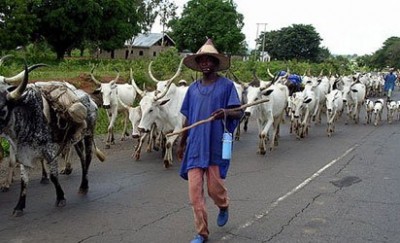Written by the Editorial board of The Guardian Newspaper
A pattern of killings perpetrated by supposed herdsmen which began about a year ago appears unabating and this should worry all Nigerians from the President to the peasants.
Notably, the most gruesome killings by the herdsmen occurred in Agatu, Benue State, and Ukpabi Nimbo and Uzo-Uwani communities in Enugu, drawing anger from across the country. Despite the outrage over the activities of the herdsmen, however, there has been no let on their part. Indeed, their blood-letting has continued to rise in frequency and intensity in the land. This is a dangerous trend that must be curbed with the arrest, prosecution and conviction of perpetrators and their sponsors.
Barely a week ago, in Adamawa and southern part of Kaduna, some villages came under brutal attacks from the herdsmen in ways that left their victims in horror and the whole of Nigeria in shock. In Adamawa State, Kodomun was attacked and at the last count no less than 30 people were believed to have been slaughtered. Similarly, Southern Kaduna, traditionally at the receiving end of incessant attacks by herdsmen was again attacked with loss of lives in large numbers. Gada Biyu, Akwa’a and Agwan Ajo villages were the two communities thrown into a theatre of killings by the herdsmen.
Recently, a traditional ruler, Lazarus Agai, the Saf Ron Kurele, in Bokkos town in Plateau State was killed while visiting his farm, by the same herdsmen. Amidst the agony of the attack, protesting youths were shot at by men of the Special Task Force operating in the state in ways most impunitious. Again, in Niger State, a cluster of villages in Bosso Local Council, namely Lunko, Kopa and others which had earlier been under attack by the herdsmen was also subjected to a dawn raid by the military men from the 31 Artillery Brigade and the Air Force Base in Bosso ostensibly in search of arms.
It is to be noted that the killings by the herdsmen have cumulatively rendered lives so cheap in Nigeria, thereby debasing our common humanity. What is more worrisome is the attitude of the government which is not only sinister but appears to give imprimatur to the carnage going on in the country. The action of the Police Commissioner in Adamawa State, Mohammed Ghazzali, who refused to act to save lives allegedly for fear of partisanship, lends credence to the point being made of official complicity in the prevailing mayhem. Indeed, Mr. Ghazzali said inter alia, “My men were on the ground. We would not risk our men to be there just to give security to one side so that the other side will not think that we are taking side with one side.” In another twist, the intervention of the Police in Southern Kaduna communities halted further attack and avoided more bloodshed.
Nevertheless, government’s attitude has been unedifying, to say the least. The arrest of some young men in some communities in South-East of Nigeria who gathered to deliberate over the threat to their lives and the subsequent display of partisanship by the Department of State Security (DSS) now reinforce perception of government complicity. So far, it has either shamelessly denied the reality on the ground or talked about providing grazing reserves in ways that show insensitivity to the host communities. Government spokesmen have even said that “the herdsmen inflicting violence on their host communities in the country are not Nigerians, let alone being the usual Fulani known for cattle rearing and roving grazing in Nigeria.”
If the herdsmen attacking Nigerians are not Nigerians, the duty then is for the government to provide security for its own people lest they are compelled to resort to self-help. Policing the states where these killings are taking place is an imperative, for the perception is growing that the herdsmen have state protection. This is obviously dangerous, because perception is reality and people can act on the basis of that. The institutions of the state should turn new leaf in their attitude to tackling this clear and present danger to national security. It also needs be said that there is already a prospect of famine on account of the destruction of farm lands and security scare in farming communities in the country.
Meanwhile, it is important to note that in a territory-based diversity which Nigeria is, it is most unwise a policy for the government to acquire people’s land in the name of grazing reserves. It is indeed an affront on the sovereignty of the people. Cattle rearing is a private business and the entrepreneurs should purchase land from land-owning communities for ranching. Alternatively, state governments should build ranches and rent same to cattle owning businessmen who are in need or, in a more practical sense, set up cattle ventures themselves to cater for the nutrition of their people.
The widespread killing by herdsmen is a governance problem and considerate leadership is required to address this. Much of the solution, of course, lies in restructuring of the Nigerian state so that the country can be stronger and united. Nigerians want peace and confrontations can be defused by means of restructuring into a federation that harnesses the diversity of the people for the wellbeing of all.
(adsbygoogle = window.adsbygoogle || []).push({});


